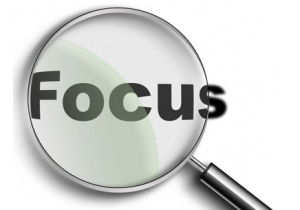 “One reason so few of us achieve what we truly want is that we never direct our focus; we never concentrate our power. Most people dabble their way through life, never deciding to master anything in particular.” – Tony Robbins
“One reason so few of us achieve what we truly want is that we never direct our focus; we never concentrate our power. Most people dabble their way through life, never deciding to master anything in particular.” – Tony Robbins
Dr. James Loehr said, “We have the right focus when what we are doing is the same as what we are thinking.” That’s pretty simple. Part of a very complicated act (focusing) is that we focus when we are in the moment; totally mindful and aware of what we are doing in the present. With all of the distractions the world offers, however, it can be a very difficult task. So, in the spirit of becoming better, let’s take a look at 3 Ways to Become More Focused.
1. Know Your Brain. Everyone is different. Most, according to the research, focus best in the morning and the late evening (bookends of brain power, I call it). If that is the case for you, schedule your focused tasks for a time easily focused. David Rock, from the Neuro Leadership Institute and author of the book Your Brain At Work, says that too often we schedule the easy tasks first and work our way up to the tougher. This is not the best use of our focus-ability. We do mindless work first and build up to the toughest tasks. That drains your energy and lowers your focus. “An hour into doing your work, you’ve got a lot less capacity than (at the beginning),” Rock says. “Every decision we make tires the brain.”
2. Train Your Brain. When we attempt multitasking as the norm, our brain quickly adapts. We lose the ability to focus as distraction becomes a habit. “We’ve trained our brains to be unfocused,” Rock says. So instead, of succumbing to the lack of focus, it would be helpful to practice focusing. Begin with as little as five minutes and work up to longer stretches. Clear out your mind of everything other than the present task. Be right there, right at that moment. Mental calmness, low anxiety, alertness will all contribute to a more focused state. Meditation is great practice as it teaches us to clear (empty) our minds. Controlling your breathing also helps as it is a fantastic tool for self regulation. Loehr recommends “Breathing in to a count of three and out to a count of six. Deep, smooth and rhythmic breathing is simultaneously a source of energy, alertness, and focus as well as relaxation.”
3. Cut distractions. Having already mentioned the clearing of our brains, we can aid that process through the clearing of our physical space. Begin with a clear work area, free from spatial anxiety. Create distraction free time blocks. No internet, no phone, no email or social media. Sound scary? Rock says, “Twenty minutes a day of deep focus could be transformative.” Ages ago, Rick DeLuca promoted use of a STOP sign to be used at the desk or office. Basically it notified anyone coming into this distraction free space that they should keep it that way. I will often adorn myself with noise cancelation headphones to block out the world (no, nothing coming through them, music or anything, just a guarantee of silence). The bottom line is this: fewer distractions = better focus.
It is not possible to be 100% focused, 100% of the time. In fact, would would want that? But in appropriate chunks, when we focus, we win. Proverbs 4:25 (yeah, a Bible quote) says, “Let your eyes look directly forward and your gaze be straight before you.” Great advice.
At NAR? Check out my session on November 7, 2013 from 2:25 – 3:40 at the Palace Hotel “Re-Brain: Picking Your Brain to Success”
Thanks. See you soon.